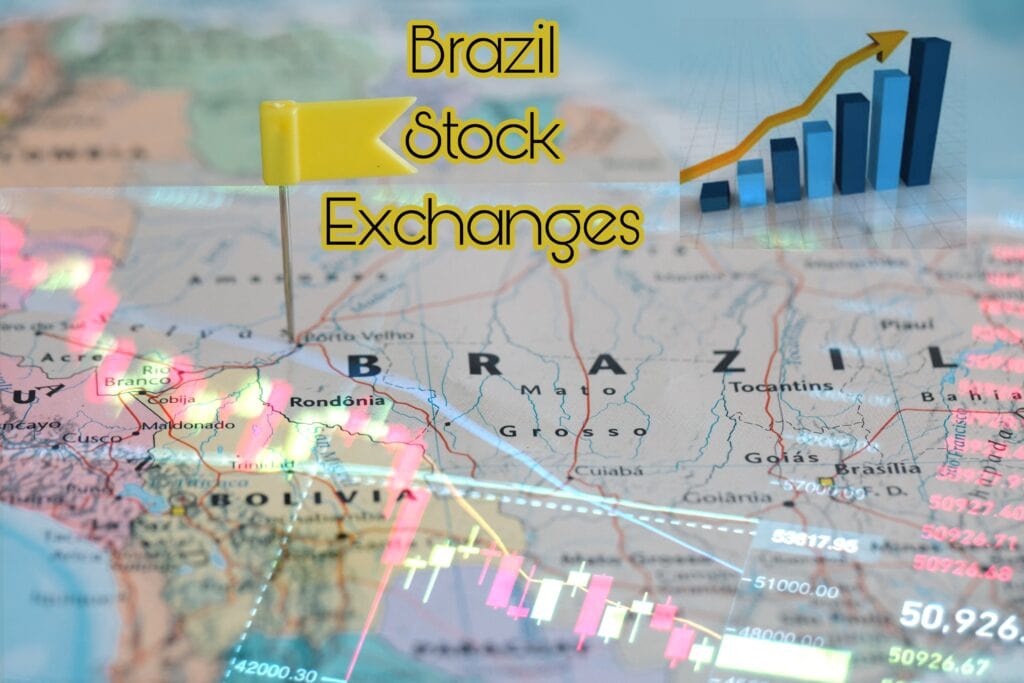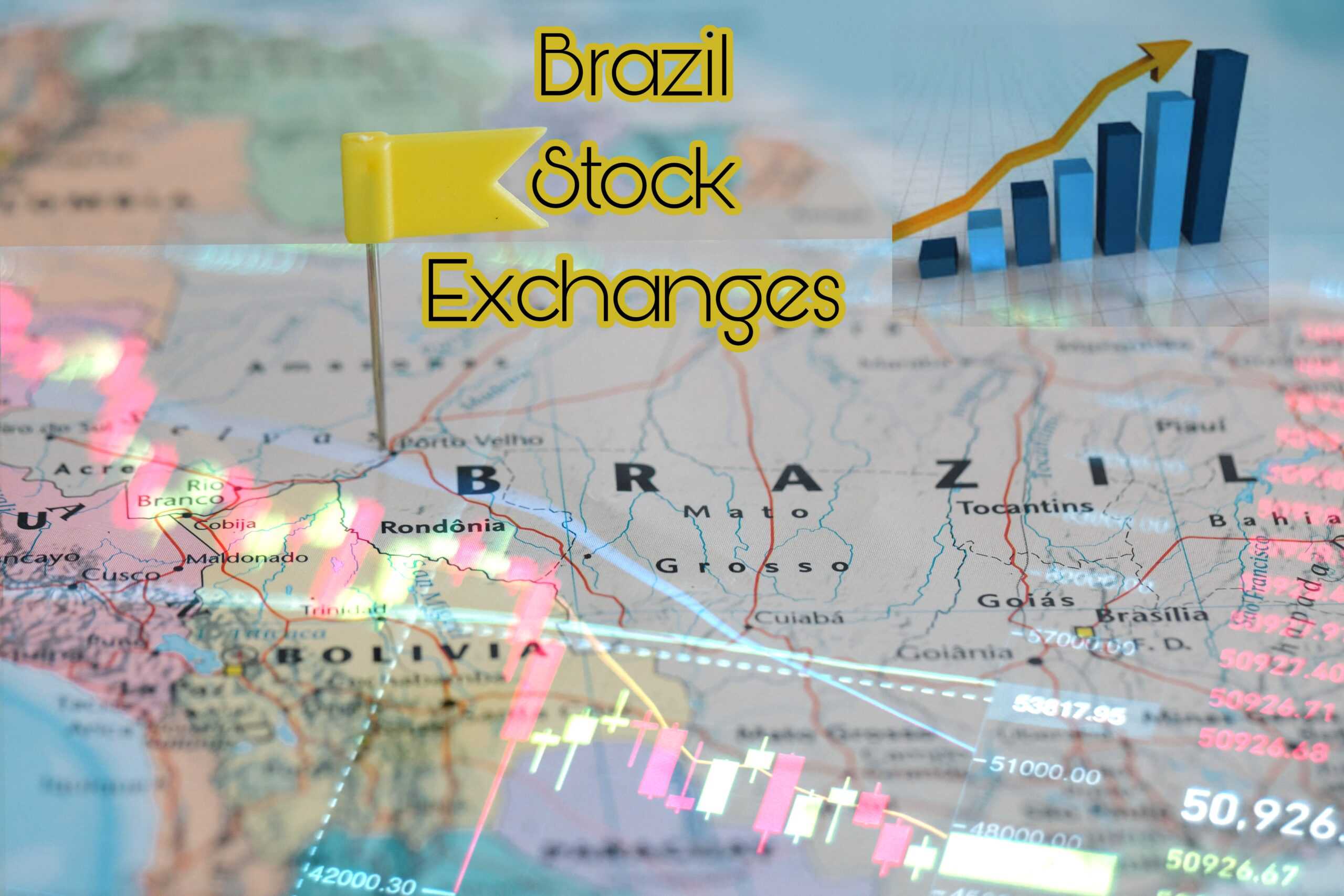
Table of Contents
List of All Stock and Security Exchanges in Brazil
Introduction
Welcome to MoneyOrbis! Today, we’re breaking down list of all stock and security exchanges in Brazil. Whether you’re an emerging investor or just curious, join us in exploring the key players shaping Brazil’s economic game. Let’s get down to the basics and uncover the world of Brazilian financial markets. Ready? let’s get started!
Main Stock Exchange:-
- B3 (Brasil, Bolsa, Balcão)
Other Stock Exchanges:-
- São Paulo Stock Exchange (Bolsa de Valores de São Paulo – Bovespa)
- Rio de Janeiro Stock Exchange (BVRJ)
- Minas Gerais Stock Exchange (BVMG):
- Bahia Stock Exchange (BVRBA):
- South Stock Exchange (Bolsa do Sul):
Main Stock Exchange:-
B3 (Brasil, Bolsa, Balcão)
B3 (Brazil, Bolsa, Balcão) is the main stock exchange of Brazil. It was formed in March 2017 by the merger of BM&FBOVESPA (São Paulo Securities, Commodities and Futures Exchange) and CETIP (Central de Custodia e de Liquidação Financiera de Securities).
B3 acts as a comprehensive financial market infrastructure, providing trading services for a variety of financial instruments. Some of the key aspects and functionalities of B3 include:
Equity Market: B3 facilitates the trading of equities (stocks) of Brazilian companies, providing a platform for investors to buy and sell shares.
Derivatives Market: It offers a wide range of derivatives instruments such as futures and options on various underlying assets including stocks, indices, currencies, commodities and interest rates.
Fixed-Income Securities: B3 provides a platform for trading fixed-income securities such as government bonds, corporate bonds and other debt instruments.
Commodity markets: Exchanges enable trading of futures and options contracts of commodities including agricultural products, metals, energy and others.
Clearing and Settlement Services: B3 provides clearing and settlement services to ensure proper execution and settlement of trades made on its platform.
Market Data and Indices: B3 compiles and disseminates market data, indices (such as Ibovespa), and financial information to market participants.
Corporate Governance Services: It provides services related to corporate governance, including listing requirements for companies wishing to go public and be listed on an exchange.
B3 plays an important role in the Brazilian financial system by providing a platform for trading of various financial instruments and promoting liquidity and transparency in the markets. It is headquartered in São Paulo and is one of the largest stock exchanges in Latin America.
Merger and Formation: B3 was formed in 2017 by the merger of BM&FBOVESPA (Brazilian Mercantile and Futures Exchange) and CETIP (Central de Custodia e de Liquidação Financieira de Titulos). This merger brought together the equity, derivatives and securities markets, creating. A comprehensive and diverse financial exchange platform.
National-level exchange: B3 serves as the main stock exchange in Brazil, offering a wide range of financial services. It serves as a primary platform for trading various financial instruments including stocks, derivatives, commodities, fixed income securities and currencies.
Market importance: B3 is a major player in the Brazilian financial market and has significant influence nationally and internationally. It attracts a large number of investors, traders and listed companies, contributing to the overall liquidity and vibrancy of Brazil’s financial markets.
Regulatory Oversight: B3 operates under regulations set by the Brazilian Securities and Exchange Commission (CVM), the Brazilian financial regulatory body, which ensures compliance with the rules and guidelines established for fair and transparent market operation.
Market Innovation and Technology: B3 emphasizes technological advancements to improve trading infrastructure, enhance market efficiency, and offer innovative financial products and services to market participants.
Diverse market offering: It offers a broad spectrum of market offerings that meet the preferences and needs of different investors, including a platform for equity trading, futures and options contracts, clearing and settlement services and fixed income securities .
Continuous growth: B3 is constantly evolving and adapting to changing market dynamics, aiming to remain at the forefront of the Brazilian financial landscape by introducing new products, enhancing services and maintaining a competitive market environment .
Address- R. Quinze de Novembro, 275 – Centro Histórico de São Paulo, São Paulo – SP, 01010-901, Brazil
Website- https://www.b3.com.br/
B3 stands as a key institution in Brazil’s financial ecosystem, playing a central role in the country’s capital markets by providing a comprehensive platform for trading, investment and financial services.
Other Stock Exchanges:-
São Paulo Stock Exchange (Bolsa de Valores de São Paulo – Bovespa)
The São Paulo Stock Exchange, commonly known as Bovespa, underwent significant changes and transformations that reshaped Brazil’s financial landscape:
Founding and historical significance: Founded in 1890, Bovespa served as an important stock exchange in São Paulo, and played an important role in Brazilian financial markets for many years.
Merger with BM&F: In 2008, Bovespa merged with Brazilian mercantile and futures exchange BM&F, marking a milestone in the history of the Brazilian financial market. This consortium merged the equity and derivatives markets, creating a more comprehensive and diverse exchange platform.
Formation of BM&FBOVESPA: The merger between BOVESPA and BM&F created BM&FBOVESPA, strengthening its position as a leading financial institution in Brazil. This entity represents the integration of the stock and futures markets, promoting growth and innovation in the Brazilian financial sector.
Subsequent Merger with CETIP: In March 2017, BM&FBOVESPA underwent another transformation by merging with CETIP, known as Central de Custódia e de Liquidação Financeira de Títulos. This merger resulted in the creation of B3, named Brasil, Bolsa, Balcão.
Integration and Legacy: While the name Bovespa no longer operates as an independent entity, its legacy remains significant in the history and development of the Brazilian stock market, particularly in São Paulo. The operations and significance of Bovespa were integrated into the broader B3, which stands as the primary stock exchange in Brazil, offering diverse financial market services encompassing equities, derivatives, fixed income, and more.
The evolution from Bovespa to B3 signifies the culmination of various mergers and transformations, creating a more robust and comprehensive financial market infrastructure in Brazil. B3 continues to shape and drive the Brazilian financial ecosystem, carrying forward the legacy and influence of its predecessor,Bovespa.
Rio de Janeiro Stock Exchange (BVRJ)
The Rio de Janeiro Stock Exchange (BVRJ) was historically one of the important regional stock exchanges in Brazil. Key points related to BVRJ include:
Regional importance: BVRJ operates as a regional stock exchange in Rio de Janeiro, Brazil, playing an important role in providing a platform for local companies to list their securities and facilitating trading activities within the region .
Local capital access: Similar to other regional exchanges, the BVRJ allows local businesses to access capital markets by listing stocks, bonds and other financial instruments. Its purpose is to support local economic development by providing opportunities for companies to raise funds and investors to participate in local businesses.
Market development and change: Over time, factors such as market consolidation and the dominance of large national exchanges, especially the B3 (Brazil, BOLSA, BALCA), affected the operation and relevance of regional exchanges like the BVRJ.
Decreased prominence: Like many other regional stock exchanges in Brazil, the BVRJ faced challenges in maintaining adequate trading volume and competitiveness compared to the larger national exchanges. This has led to a decline in its influence and relevance over the years.
Current Situation: Specific details regarding the current situation or recent developments related to the Rio de Janeiro Stock Exchange (BVRJ) may not be readily available before January 2022 due to its low significance. For the most recent and detailed information about BVRJ or any other regional exchange, it is advisable to consult updated financial databases, regulatory sources or local financial institutions in Brazil.
BVRJ, as a regional exchange, was part of Brazil’s diverse stock market landscape, aiming to meet the specific financial needs of Rio de Janeiro’s local businesses and investors. However, its operation and influence may be affected by the dominance and widespread reach of large national exchanges in the country.
FAQ: Stock Exchanges in Brazil
What is the main stock exchange in Brazil?
The main stock exchange in Brazil is B3 (Bolsa de Valores do Brasil), formed through the merger of BM&FBOVESPA (Bolsa de Mercadores and Futuros and Bolsa de Valores, Mercadores and Futuros de São Paulo) and CETIP (Central de Custodia e I went. Securities Financial Settlement) in 2017. B3 is Brazil’s main financial market, where stocks, commodities and other financial instruments are traded.
Is there a stock market in Brazil?
Yes, there is a stock exchange in Brazil, and it is known as B3 (Bolsa de Valores do Brasil). B3 is the country’s main stock exchange and one of the largest financial markets in Latin America. It facilitates trading of various financial instruments including stocks, commodities, futures and options. Investors and companies use the B3 to buy and sell securities, and it plays an important role in the Brazilian financial system.
Read More
- List of Stock and Security Exchanges in United States
- List of Stock and Security Exchanges in Australia 2024
- List of Stock and Security Exchanges in India
- Dow Jones Index Stocks List and classification
- Nyse Energy Sector Best Dividend Stocks in 2024
- Top 5 Energy Sector Highest Dividend Giving Stocks in NASDAQ

